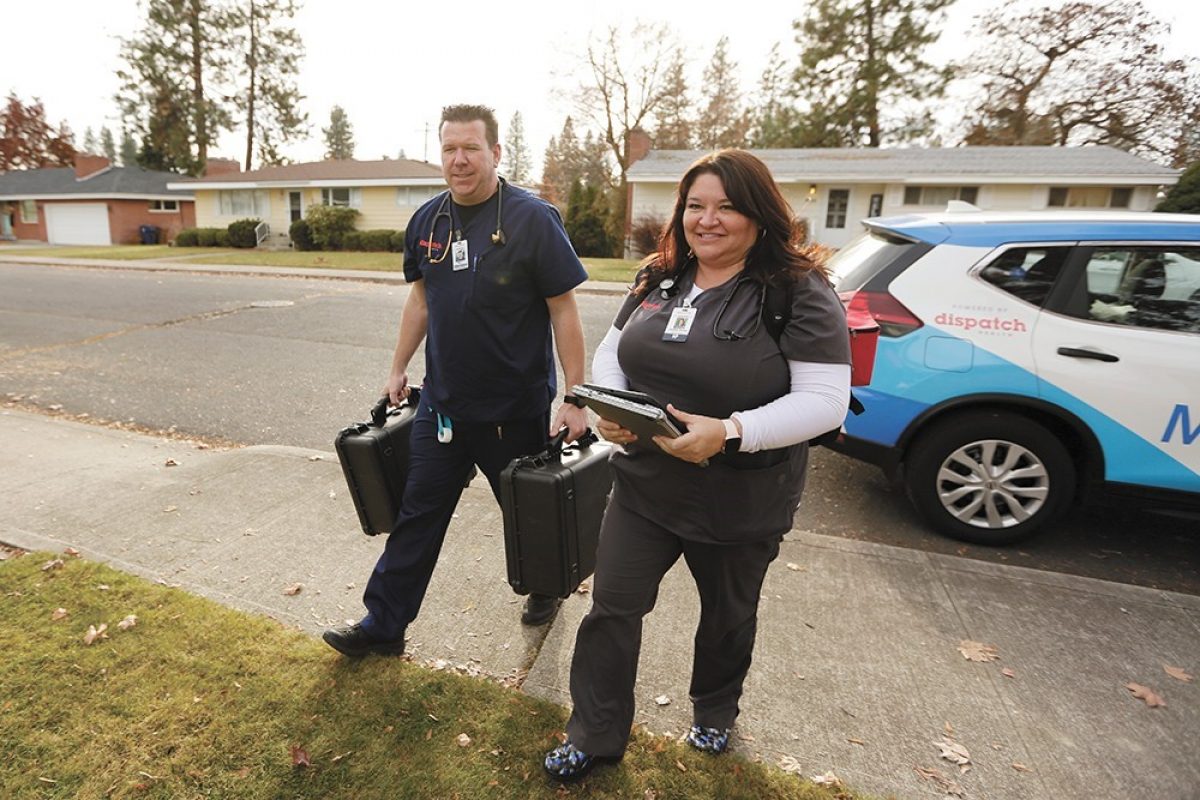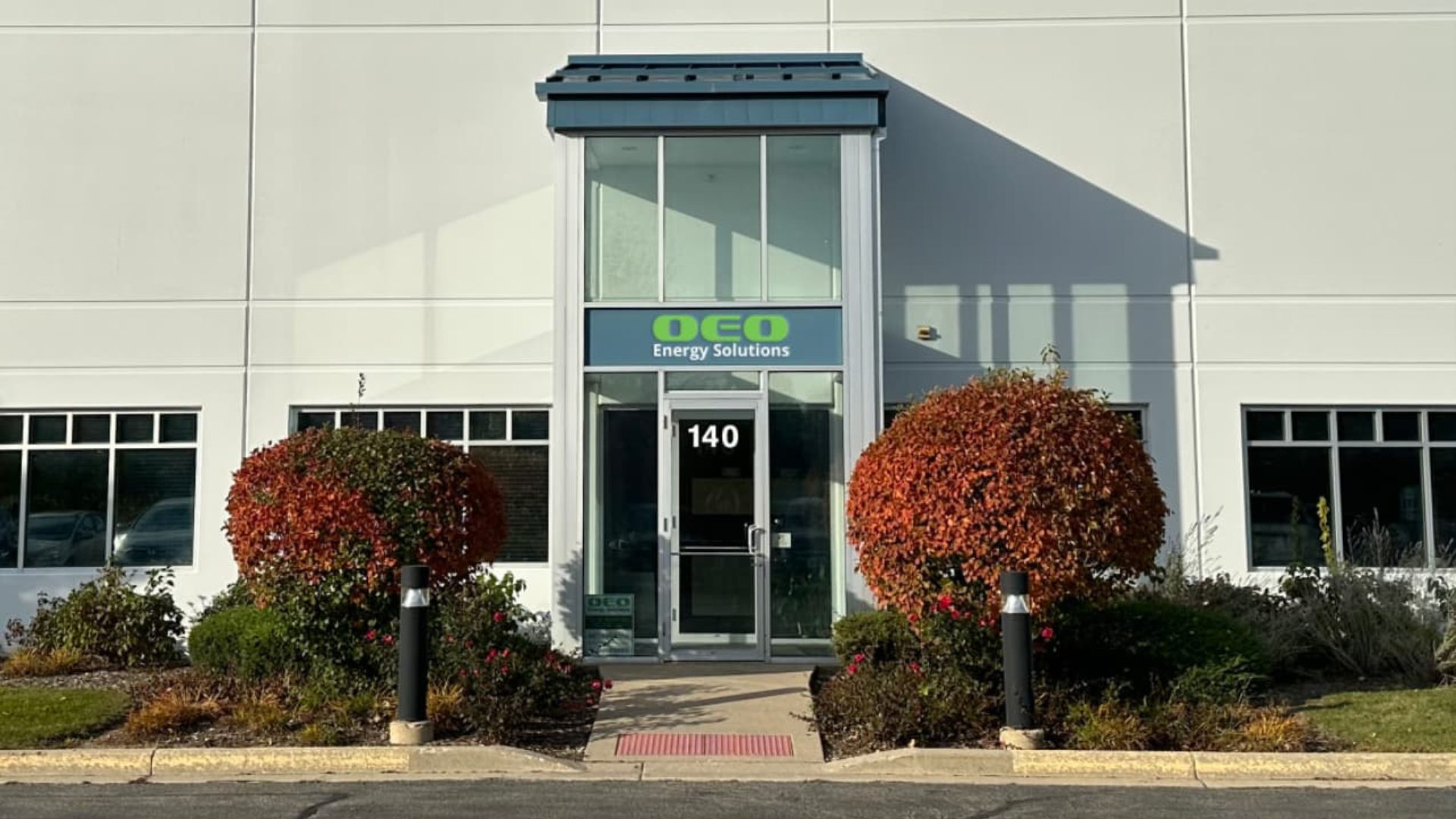DispatchHealth is a new, on-demand urgent care service, that is changing how we view healthcare delivery here in Spokane County.
The service works by dispatching a board-certified medical team to its patient’s home or office.
“We’re an acute care platform, that operates like a mobile care service,” explains Karrie Austin, the company’s regional market director. “Patients can be referred to us by their physicians, senior living, or home health agencies.”
Austin says DispatchHealth’s mobile medical teams consist of either a nurse practitioner or physician’s assistant and an EMT trained medical technician.
Teams travel with medical kits that allow them to treat conditions commonly seen in urgent care, as well as a lab that enables common testing, and a mini-pharmacy with basic mouth and IV medications. Each team is also able to access a board-certified physician by phone or video call if needed.
“We’re able to do about 70 percent of what a normal ER is capable of doing, including things like placing an IV or catheter, laceration repair, splints, or even breathing treatments,” she says.
DispatchHealth has an office in Spokane Valley at 920 N. Argonne, but care teams remain on the road throughout their shift.
“Our services are available 8 a.m. to 10 p.m. daily, 365 days a year, including weekends and holidays,” Austin says.
She says patients can request a visit through the company’s phone app, online at the company’s website, or by phone.
“The app makes it really easy to preload information, so that later when you need care all you have to do is press a button. We then call you back (usually within a minute or less) to ask additional questions and set up the visit,” she says.
DispatchHealth was brought to Spokane Valley in August 2019, through a partnership with MultiCare Health System, which operates Deaconess and Valley hospitals here.
Austin says the company’s goal in partnering with MultiCare was to help improve healthcare access for Spokane’s at-risk patient populations and address their acute care needs at a fraction of the cost.
“We want to provide the right size healthcare model to populations in need, at the right cost,” she says. “To that end, DispatchHealth partners with almost all of the major insurance companies, including Medicare and parts of Medicaid, which enables us to drive down the cost of care significantly.”
Austin says the company’s first year here has gone well, as it continues to raise awareness of its services.
“We’ve worked diligently to integrate our healthcare model with various at-risk populations, particularly senior living communities and home health agencies,” she says. “We’ve also been working with MultiCare to address some of their patients’ needs at home.”
Austin says DispatchHealth’s service area includes the majority of Spokane County, an estimated 475,000 people. She says that since its start, DispatchHealth has seen about 2,000 patients, and received overwhelmingly positive feedback.
“Patients seen in the emergency room often express negative feedback, as their physical discomfort is compounded by long waits and a high cost,” she says. “However, our patients are seen quickly, within the comfort of their home environment, and generally seem more satisfied with the level of care received.”
DispatchHealth joined the Greater Spokane Valley Chamber last fall and made an early splash in the community as a sponsor for its Greater Cures event, which featured the topic of mental health in the workplace.
Austin says participating in the event gave the company an opportunity to raise awareness of its services, as well as develop relationships and partnerships with local mental health organizations.
“We wanted to support the event because we realize how impactful mental health is on overall health,” she says. “When we visit a patient and identify a mental health risk or need, it’s important have relationships established with those organizations so that we can provide them those resources and get them the help they need.”
Prior to DispatchHealth’s Spokane launch, the mobile healthcare model was a relatively new idea. However, Austin says a combination of increased awareness, and the COVID-19 pandemic have brought the need for such services to the forefront.
“COVID-19 has definitely highlighted a shift we’ve been seeing in how healthcare is delivered,” she says.
“We’ve been uniquely positioned to meet the needs of in-home care during this time, but it’s also helping people to see how models like ours, that bring care directly to the patient, can result in better outcomes and higher patient satisfaction.”
Austin says one of the challenges in bringing care to patients in their homes during COVID-19, has been maintaining safety for both providers and patients during the epidemic.
“We’ve worked really hard to ensure safety through enforcing infection control guidelines, not just for COVID-19 but other communicable diseases,” she says. “We’re constantly looking to ensure that our work follows the best guidelines to keep our teams, patients, and communities safe.”
While DispatchHealth is able to treat respiratory symptoms and suspected COVID-19 cases, she says testing for the disease remains at the discretion of providers and is based on thorough evaluation.
“Right now COVID-19 testing is limited, but we’re currently working with MultiCare Health System, local laboratories, and the Department of Health to create a more robust testing system that would enable the testing of even asymptomatic patients,” Austin says.
Austin says she believes awareness of and demand for mobile and in-home healthcare models like DispatchHealth will continue to increase even after the COVID-19 crisis has subsided.
“Healthcare first started with physicians visiting patient’s homes, then moved to clinics and hospitals,” she says. “Now as we continue to see increasing costs and poorer outcomes, we’ve begun to see a shift back to platforms that bring care back to the patient at a lower cost.”
Looking ahead, Austin says DispatchHealth plans to continue expanding via increased community engagement, additional mobile teams, and extended hours.
“We have two Spokane teams right now but we’re working to grow this market and extend into Coeur d’Alene this fall,” she says.
“It’s about improving the look and feel of healthcare,” she adds. “With increasing demand, I think this model may even evolve from simply acute care to greater in-home services in the coming years.”







